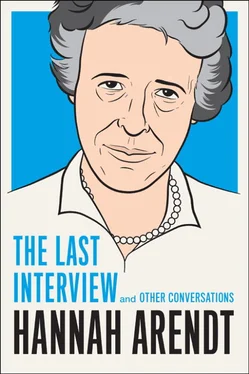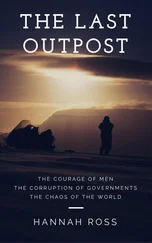This, of course, is a shocking statement. I think that at the same time it is entirely true. What is really necessary is—if you want to keep your integrity under these circumstances—then you can do it only if you remember your old way of looking at such things and say: No matter what he does, if he killed ten million people, he is still a clown.
ERRERA:When you published your book on the Eichmann trial, it aroused some very violent reactions. Why were there such reactions?
ARENDT:Well, as I said before, this controversy was partly caused by the fact that I attacked the bureaucracy, and if you attack a bureaucracy, you have got to be prepared for the fact that this bureaucracy will defend itself, will attack you, will try to make you impossible and everything which goes with it. That is, more or less, dirty political business. Now, with this I really had no real quarrel. But suppose they had not done it, suppose they had not organized this campaign, then still the opposition to this book would have been strong, because the Jewish people were offended, and now I mean people whom I really respect. And therefore I can understand it. They were offended chiefly by what Brecht referred to, by laughter. My laughter was, at that time, kind of innocent and kind of not reflecting on my laughter. What I saw was a clown.
So, Eichmann, for instance, was bothered never by anything which he had done to the Jews in general. But he was bothered by one little incident: he had slapped the face of the then president of the Jewish community in Vienna during an interrogation. God knows many worse things were happening to many people than to be slapped in the face. But this he has never condoned himself for having done, and he thought this was very wrong, indeed. He had lost his cool, so to speak.
* * *
ERRERA:Why do you think we are seeing the emergence of a whole literature that, when it comes to Nazism, for instance, often describes its leaders and their crimes in a novelistic way and tries to humanize them, and thereby indirectly to justify them? Do you think that publications of this kind are purely commercial, or do they have a deeper significance?
ARENDT:I think it has a signification , at least it shows that what happened once can happen again, and this indeed, I believe, is entirely true. You see, tyranny has been discovered very early, and identified very early as an enemy. Still, it has never in any way prevented any tyrant from becoming a tyrant. It has not prevented Nero, and it has not prevented Caligula. And the cases of Nero and Caligula have not prevented an even closer example of what the massive intrusion of criminality can mean for the political process.
HANNAH ARENDT(1906–1975) was a political theorist and scholar. Born in Germany into a family of secular Jews, as a young woman she studied philosophy with Martin Heidegger and Karl Jaspers. In 1933, she was arrested and interrogated by the Gestapo, and subsequently interned in a concentration camp in the south of France, Camp Gurs. She fled to the United States in 1941 with her husband Heinrich Blücher. In the United States, she served as a visiting scholar at the University of California, Berkeley, the University of Chicago, Northwestern, Wesleyan, Princeton, Yale, and the New School for Social Research. She died in New York City at the age of sixty-nine.
ANDREW BROWNis a Cambridge-based translator from French and German, and the author of Roland Barthes: The Figures of Writing.
ROGER ERRERAis a former member of the Conseil d’Etat , France’s Supreme Court for administrative law, and the United Nations Human Rights Committee, and an Honorary Fellow of the University of London. He is the author of a number of essays on media law, judicial institutions, immigration and refugee law, and European law. His most recent book is an essay on justice in France, Et ce sera justice…: Le juge dans la cité (Paris: Gallimard, 2013).
JOACHIM FEST(1926–2006) was a historian, journalist, and critic. He was the son of strongly anti-Nazi parents who refused to enroll him in the Hitler Youth. He edited the cultural section of the Frankfurter Allgemeine Zeitung from 1973 to 1993. He is also the author of a major biography of Hitler and other works on the Third Reich, including Inside Hitler’s Bunker: The Last Days of the Third Reich , Speer: The Final Verdict , and Plotting Hitler’s Death: The German Resistance to Hitler , 1933–1945.
GÜNTER GAUS(1929–2004) was a journalist, television presenter, and politician. His show, Zur Person (In person), in which he interviewed politicians, scientists, and artists, ran from 1963 to 2003.
DENVER LINDLEYwas an editor at Henry Holt, Harcourt Brace, and the Viking Press. His translations include Thomas Mann’s Confessions of Felix Krull , Confidence Man: The Early Years , Erich Maria Remarque’s Arch of Triumph , and André Maurois’s Memoirs: 1885–1967.
URSULA LUDZis the editor of Letters: 1925–1975 by Hannah Arendt and Martin Heidegger , Denktagebuch (together with Ingeborg Nordmann) and Ich will verstehen , a collection of autobiographical statements by Arendt and a complete bibliography of her works. She is also a member of the editorial staff of the Internet journal HannahArendt.net.
ADELBERT REIFis a journalist and the editor of Claude Lévi-Strauss’s Myth and Meaning: Five Radio Talks , among other books.
JOAN STAMBAUGHis Professor Emeritus at Hunter College, and the translator of a number of books by Martin Heidegger, including Being and Time , Identity and Difference , and The End of Philosophy.
THE LAST INTERVIEW SERIES

KURT VONNEGUT: THE LAST INTERVIEW

“I think it can be tremendously refreshing if a creator of literature has something on his mind other than the history of literature so far. Literature should not disappear up its own asshole, so to speak.”
$15.95 / $17.95 CAN
978-1-61219-090-7
ebook: 978-1-61219-091-4
LEARNING TO LIVE FINALLY: THE LAST INTERVIEW JACQUES DERRIDA

“I am at war with myself, it’s true, you couldn’t possibly know to what extent… I say contradictory things that are, we might say, in real tension; they are what construct me, make me live, and will make me die.”
translated by PASCAL-ANNE BRAULT and MICHAEL NAAS
$15.95 / $17.95 CAN
978-1-61219-094-5
ebook: 978-1-61219-032-7
ROBERTO BOLAÑO: THE LAST INTERVIEW

“Posthumous: It sounds like the name of a Roman gladiator, an unconquered gladiator. At least that’s what poor Posthumous would like to believe. It gives him courage.”
translated by SYBIL PEREZ and others
$15.95 / $17.95 CAN
978-1-61219-095-2
Читать дальше
















